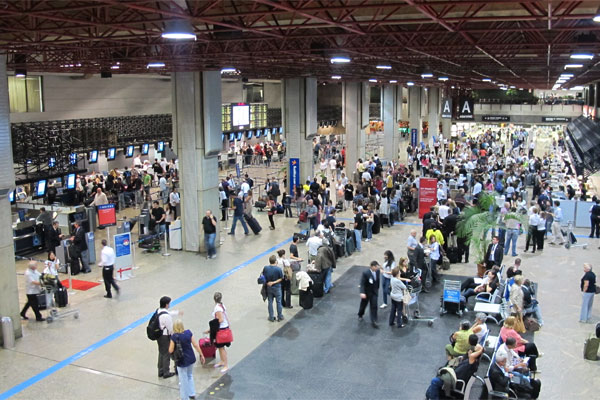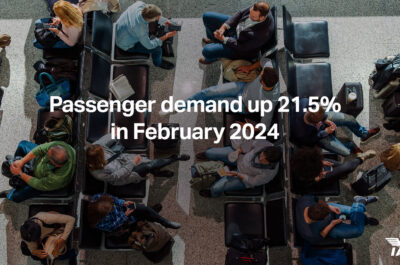
Sao Paulo’s Guarulhos Airport.
Across Latin America and the Caribbean demand in RPK fell by 87.5% in July 2020 year-on-year, with capacity (Available Seat Kilometers) dropping by 83.2%.
MIAMI – The International Air Transport Association (IATA) has renewed its call on governments in Latin America and the Caribbean to allow a wider restart for aviation, as well as consider providing further financial relief and aid to the airlines.
According to the latest figures released by the association, global demand measured in Revenue Passenger Kilometres (RPK) has retracted by 79.8% in July 2020 as compared to July 2019. This was a slight improvement on the 86.8% year-on-year decline registered in June 2020.
Across Latin America and the Caribbean demand in RPK fell by 87.5% in July 2020 year-on-year, with capacity (Available Seat Kilometers) dropping by 83.2%. Load factor hit 63.1%, once again a sign that there is demand for travel in the market (global average load factor is 57.9% in July 2020).
Airlines based in the region are clearly showing the fallout of the continued lockdown in many countries. Demand in July dropped 95%, compared to the same month last year, versus a 96.6% drop in June. Capacity fell 92.6% and load factor sank 27.1 percentage points to 58.4%, although highest among the regions, again as an indication that some demand is present in the market.
Latin American carriers posted a 32.1% drop in year-on-year international demand in July, down from a 28.6% decline in June. International capacity decreased 44.5%. The drop in both demand and capacity was the most severe of all regions. The COVID-19 crisis is particularly challenging at present for airlines based in Latin America owing to strict lockdown measures. In July the Latin American air cargo market was smaller than the African market for the first time since these statistics have been reported in 1990.
“In many countries across Latin America and the Caribbean we are now getting close to the half-year mark of suspended operations. Generating no revenues and still having to cover costs over such an extended period of time is a fight for survival for any industry. We urgently need governments to work with the us on restarting aviation, as this will ultimately help bolster economies and support livelihoods,” said Peter Cerda, IATA’s Regional Vice President, The Americas.
Argentina is now the largest market in the region where aviation remains suspended. The industry can no longer accept further postponements of reopening dates. It needs clarity on when flights can resume, especially since all biosafety protocols are in place. LATAM Argentina has already ceased operations and three international airlines – Air New Zealand, Emirates and Qatar Airways – have announced that they will not resume flights to Argentina, negatively affecting the country’s connectivity once borders reopen.
“Argentina was already going through an economic crisis before COVID-19. The fact that several international airlines have already taken the decision not to return once restrictions are lifted, shows the lack of confidence in the market. Continued procrastination by the government will further reduce the country’s international connectivity. From an industry perspective we would not want the country to become another Venezuela which over the years has gone from being one of the key aviation markets on the continent to now having very limited international connectivity,” said Cerda.
Chile, although having maintained both domestic and international flights, urgently needs to consider lifting border restrictions and quarantine regulations. International airlines have resumed operations to the country, but if demand continues to be depressed, chances are that capacity will once again be removed.
Meanwhile, Colombia this week made progress with domestic service resuming to 15 destinations, including the country’s main hub airport – Bogota. Coordinated planning with the authorities must now continue to ensure that also international services can recommence without any undue delay.
Following the resumption of domestic services back in July, the authorities in Peru announced the resumption of international services as of October. The industry is eagerly awaiting further details so airlines can begin to plan accordingly.
Bolivia has also lifted border restrictions and will permit international flights to and from Brazil, Europe, Uruguay and the USA.
While resumption of service is a positive development, what is currently being seen across the region is a patchwork of rules and regulations. This is stifling the industry restart, even though the prerequisite to open borders is contained in the International Civil Aviation Organization’s (ICAO) Take-off guidance.
“Governments came together to agree on the ICAO Take-off guidance for a safe re-start of aviation. However, there is no cooperation on implementation, thereby keeping 90% of international travel grounded. Governments need to agree on a science-based approach to reopening borders and restoring confidence in air travel”, said Cerda.
In the meantime, airlines will continue to struggle financially as they enter the sixth month of grounding, Therefore, governments will need to consider further relief and aid. While many governments and industry partners have mainly provided relief in the form of deferred payments, changes in taxation, or lowering of fees and charges, for example, only Colombia this week approved direct financial aid.
“While we applaud the decision taken by the government of Colombia to provide financial support to the country’s largest airline, we would like to remind all governments that it is the entire industry which is suffering, and not just one airline”, said Cerda.
Before COVID-19, aviation directly and indirectly, contributed US$167 billion to the region’s GDP and sustained 7.2 million jobs. If governments keep imposing restrictions on aviation in the region, this impact will be massively reduced.
“There is no need to continue restricting air transport as the industry has strict biosafety protocols in place, which have been approved by the relevant authorities. We need to learn to coexist with the virus until a vaccine has been found. Aviation is ready to play its part in the socio-economic recovery in Latin America and the Caribbean, but we need governments to allow us to do so", Cerda said.
Vicky is the co-founder of TravelDailyNews Media Network where she is the Editor-in Chief. She is also responsible for the daily operation and the financial policy. She holds a Bachelor's degree in Tourism Business Administration from the Technical University of Athens and a Master in Business Administration (MBA) from the University of Wales.
She has many years of both academic and industrial experience within the travel industry. She has written/edited numerous articles in various tourism magazines.








































































































































































